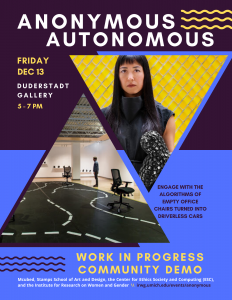Presented By: Institute for Research on Women and Gender
"Anonymous Autonomous" Work in Progress Community Demo
Katherine Behar, U-M Artist-in-Residence; Associate Professor of Art at Baruch College

Anonymous Autonomous is a robotic art installation being developed by Katherine Behar, Artist in Residence at the University of Michigan, together with a team of U-M students. As the Fall 2019 semester draws to a close, we invite the U-M community to meet the team and see the work in progress with live demos of the robots and experimentation in the Duderstadt Center Gallery.
Anonymous Autonomous is an interactive art installation that transforms empty office chairs into driverless cars. The Anonymous Autonomous Work in Progress Community Demo offers viewers a peek under the hood of two development processes—of autonomous control systems and of art installations—both of which are typically hidden in polished black boxes.
In particular, autonomous vehicles are part of a wave of transformative technologies that utilize automation, deskilling, and algorithmic decision-making. These processes are hidden in polished black boxes, where they remain out of sight and out of control for drivers and pedestrians. This hidden development process of algorithmic interactivity is similar to the hidden development process of an art installation, which is typically closed to audiences until the artwork is complete. This community demo opens up a work in progress to the public, and encourages viewers to participate in understanding and shaping algorithmic autonomous control systems.
The artist and student team members will be available to discuss their work on the robots, and demonstrate how they operate. Audience members can reroute the chairs by laying strips of paper that serve as lane markings on the floor, and also debug and tune the algorithms the chair is using to avoid these markings. We invite viewers to step behind the curtain, look under the hood, and engage in an active conversation about questions of automation, deskilling, and algorithmic decision-making.
Work in progress will continue in the gallery Dec 13–20, 2019
This project is supported by an MCubed Project by Christian Sandvig, Irina Aristarkhova, and Stephanie Rosen, a collaboration between Stamps School of Art and Design, the Center for Ethics Society and Computing (ESC), and the Institute for Research on Women and Gender.
Anonymous Autonomous is an interactive art installation that transforms empty office chairs into driverless cars. The Anonymous Autonomous Work in Progress Community Demo offers viewers a peek under the hood of two development processes—of autonomous control systems and of art installations—both of which are typically hidden in polished black boxes.
In particular, autonomous vehicles are part of a wave of transformative technologies that utilize automation, deskilling, and algorithmic decision-making. These processes are hidden in polished black boxes, where they remain out of sight and out of control for drivers and pedestrians. This hidden development process of algorithmic interactivity is similar to the hidden development process of an art installation, which is typically closed to audiences until the artwork is complete. This community demo opens up a work in progress to the public, and encourages viewers to participate in understanding and shaping algorithmic autonomous control systems.
The artist and student team members will be available to discuss their work on the robots, and demonstrate how they operate. Audience members can reroute the chairs by laying strips of paper that serve as lane markings on the floor, and also debug and tune the algorithms the chair is using to avoid these markings. We invite viewers to step behind the curtain, look under the hood, and engage in an active conversation about questions of automation, deskilling, and algorithmic decision-making.
Work in progress will continue in the gallery Dec 13–20, 2019
This project is supported by an MCubed Project by Christian Sandvig, Irina Aristarkhova, and Stephanie Rosen, a collaboration between Stamps School of Art and Design, the Center for Ethics Society and Computing (ESC), and the Institute for Research on Women and Gender.